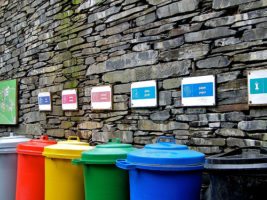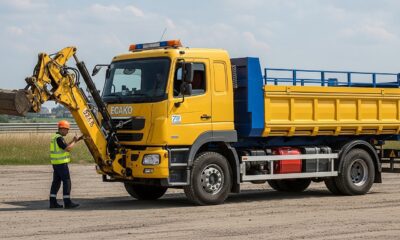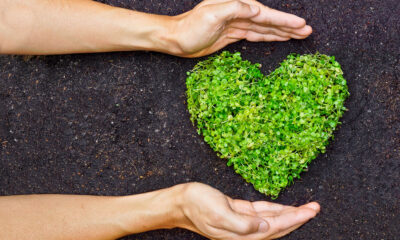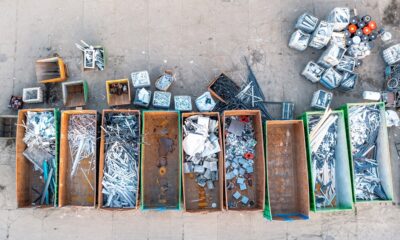

Environment
10 Great Ways For Kids To Recycle
Now that more and more people understand that they need to take steps to protect Planet Earth, they’re realizing that their children need to learn how to recycle and conserve. Helping out the environment is easier than you think, and you’re never too young to get started! Kids can start learning the basics by starting with tending to compost bins. Celebrate Earth Day (April 22nd) by trying out these easy recycling tips.
Recycling is like any good habit: The more you do it, the easier it gets!
10) Don’t Dispose Of Disposable Bags
Every time your family goes shopping, you end up with plastic bags as well as the stuff you purchased. Don’t toss those bags when you get home! Use those old bags to store items around the house or use them for bagging up smaller loads of garbage.
9) Switch To Rechargeable Batteries
We all love our electronics, but those wonderful gadgets can have a harmful effect on our environment in a lot of ways. Make your battery-powered devices eco-friendlier by using rechargeable ones instead of disposables. Batteries are stuffed with toxic ingredients, and they have to be recycled carefully to prevent environmental damage. Rechargeable batteries will cut way down on the number of batteries you get rid of.
8) Think Of Earth When You Buy
Take the time to pay closer attention to the materials products are made of. Try to buy items that are made with recycled material whenever you can. You’ll find these products in a huge range of different categories — everything from clothes to school supplies!
7) Turn Your School Green
You might think that the only place you can help with recycling is at home, but that’s not true! Check around your school to see if there are recycling litter bins in place. If there aren’t any available, ask your teacher about getting some. You may even be able to make your own recycling bins for your school; this is a great group project for your class.
6) Eco-Friendly Electronics Revisited
As mentioned above, we all use a lot of handy devices these days. Our tablets and phones aren’t made to last forever, though. You’ll end up getting rid of a lot of electronics in the coming years. Make sure you recycle your old equipment when you replace it! A lot of sellers will accept phones and other electronics for recycling when you buy new ones. Otherwise, hit the Internet and look up electronics recycling depots. There’s probably one close to you!
5) Recycling Cloth Goods
When you need to get rid of old clothes, bedsheets, towels, and other fabric items, give them a new lease on life by donating them to a charity. If your stuff is too worn out to hand off to someone else, it can still be of use! Talk to your local animal shelter; they can use these items for cleaning materials and bedding.
4) Learn To Compose
Composting is a great way to turn food waste — things like egg shells, vegetable scraps, and coffee grounds — into fertile soil for gardening. Ask your parents to help you start a compost pile.
3) Start Crafting
Arts and crafts aren’t just fun ways to express yourself and make things. They’re also a great way to reuse materials that might otherwise head into the trash. If you have newspapers, jars, cans, plastic tubs, and other craft-worthy materials, use them yourself or see if someone at your school can use them.
2) From Soda To Seedlings
Get more life out of jars and plastic soda bottles by using them to plant herbs and flowers. 2-liter soda bottles are great for this if you cut them in half.
1) Keep Practicing!
The best way to build healthy habits is to practice them regularly. Figure out the recycling chores that always need doing around your house — sorting newspapers and packaging, for example — and make a habit of doing them every day.


 Environment12 months ago
Environment12 months agoAre Polymer Banknotes: an Eco-Friendly Trend or a Groundswell?

 Features11 months ago
Features11 months agoEco-Friendly Cryptocurrencies: Sustainable Investment Choices

 Features12 months ago
Features12 months agoEco-Friendly Crypto Traders Must Find the Right Exchange

 Energy11 months ago
Energy11 months agoThe Growing Role of Solar Panels in Ireland’s Energy Future





























